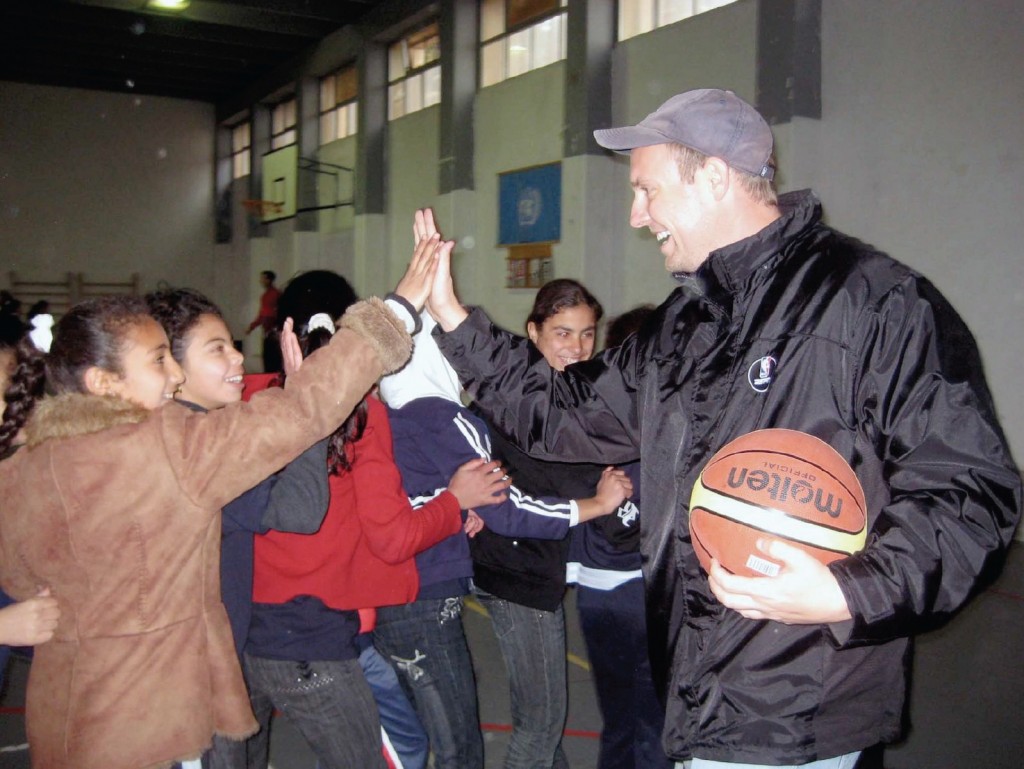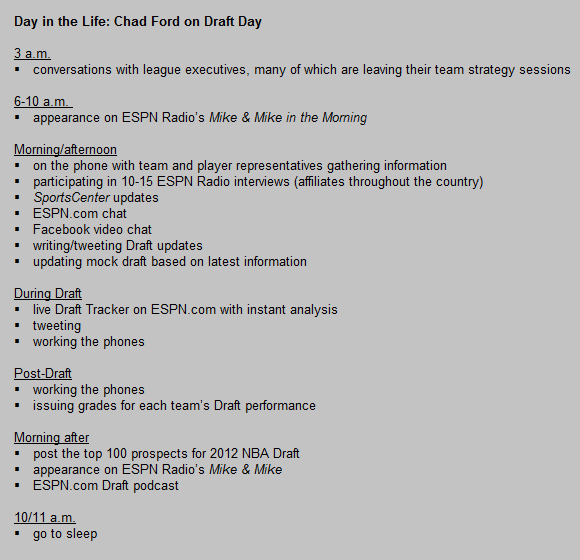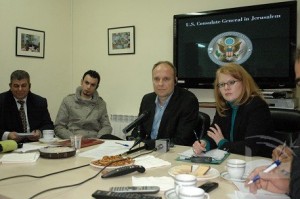Ford on NBA Draft globetrotting

Chad Ford (right) working with members of PeacePlayers International.
Prior to the 2003 NBA Draft, ESPN.com Insider Chad Ford was en route to Spain for a scouting trip to see Polish prospect Maciej Lampe.
Once Ford landed, he realized the site of the game had been switched to an island off the coast of Spain. He boarded a small plane and headed to the new destination.
There was just one problem. Ford misinterpreted the Spanish instructions he received and went to the wrong island. He then boarded a prop plane and endured a bumpy ride to the correct location.
Without a reservation, he was able to secure a hotel room where Lampe’s team was staying. Shortly after arrival, he headed to the arena.
Lampe had a terrific game, leading his team to a victory over the local team. It didn’t come without consequences, as fans in the stands began throwing warm coins (heated with cigarette lighters) at Lampe and his teammates. Ford dodged them, too, from his courtside seat.
Such is life for Ford, who offers his expertise to ESPN’s multi-platform coverage of the 2011 NBA Draft, which begins at 7 ET Thursday.
After that game in Spain, Lampe and Ford decided to go to dinner for a post-game interview. With few places open at that hour, Lampe and Ford entrusted their cab driver to pick an appropriate setting.
They proceeded up a dark, windy road until they approached what appeared to be a remote bar.
The cab driver had led them to a popular watering hole for the home team and its fans, then left. A shouting match ensued between Lampe and the locals, but they were able to safely leave the building and eventually made it back into town a few hours later.
Fortunately, Ford is well equipped in conflict resolution.
While he spends his spring and summer months mainly focusing on the NBA Draft, he also teaches fall and winter courses as a professor at BYU-Hawaii, where he specializes in large group ethnic and religious conflict situations.
“In 2005, I was offered an opportunity from my alma matter, BYU-Hawaii, to lead their center for intercultural understanding,” Ford said.
“I think I was facing a moral dilemma post-9/11. I’ve always been as passionate about conflict resolution as I am about sports.”
Ford accumulates 200,000-250,000 frequent flyer miles each year.
When he’s not traveling to Europe for an NBA Draft scouting trip, he might be working on conflict resolution in the Middle East or peace building exercises such as those with PeacePlayers International in Cyprus, Israel, Northern Ireland and South Africa.
Ford’s no-rest-for-the-weary approach began in law school at Georgetown when he operated on four hours of sleep a night.
At the time, he took classes, ran his own company (the blog sportstalk.com) and was married with two young children.
Ford earned his law degree and his company became affiliated with ESPN in 2001 (now known as ESPN Insider). By choice, Ford eventually transitioned from editor to full-time writer.
Ford focuses on the NBA Draft throughout the entire year, but he commits every waking hour to it in the weeks and months leading up to the event.
He’s constantly on the phone with NBA front office executives, including general managers and scouts, pro prospects and agents, gathering information from which he projects when prospects will be selected in his mock draft.
Ford also identifies the top 100 prospects heading into the Draft, a consensus based on his conversations with league executives, and uses a unique tier system to group players with similar Draft appeal.
“My goal is to see the top 30 prospects live in person before the Draft. I attend the combine each year, along with the Adidas Euro Camp, and player workouts in Los Angeles, Las Vegas, Chicago and New York.
“I’ve always been fascinated with the team building process — how and why a franchise’s front office builds a team the way they do it. Everything I write is through that prism.”
Ford acknowledges it can sometimes be a challenge to determine who is telling him the truth and who is feeding him information to benefit a team or player in the Draft.
“I’ve become a human lie detector. I try and build relationships based on trust and I always use multiple sources to triangulate what’s true and what’s not,” he said.
“I probably print five percent of what I hear. In some ways, my training in conflict resolution and the international skills acquired in law school have helped in that regard.”
Chad Ford at the U.S. Consulate General in Jerusalem









